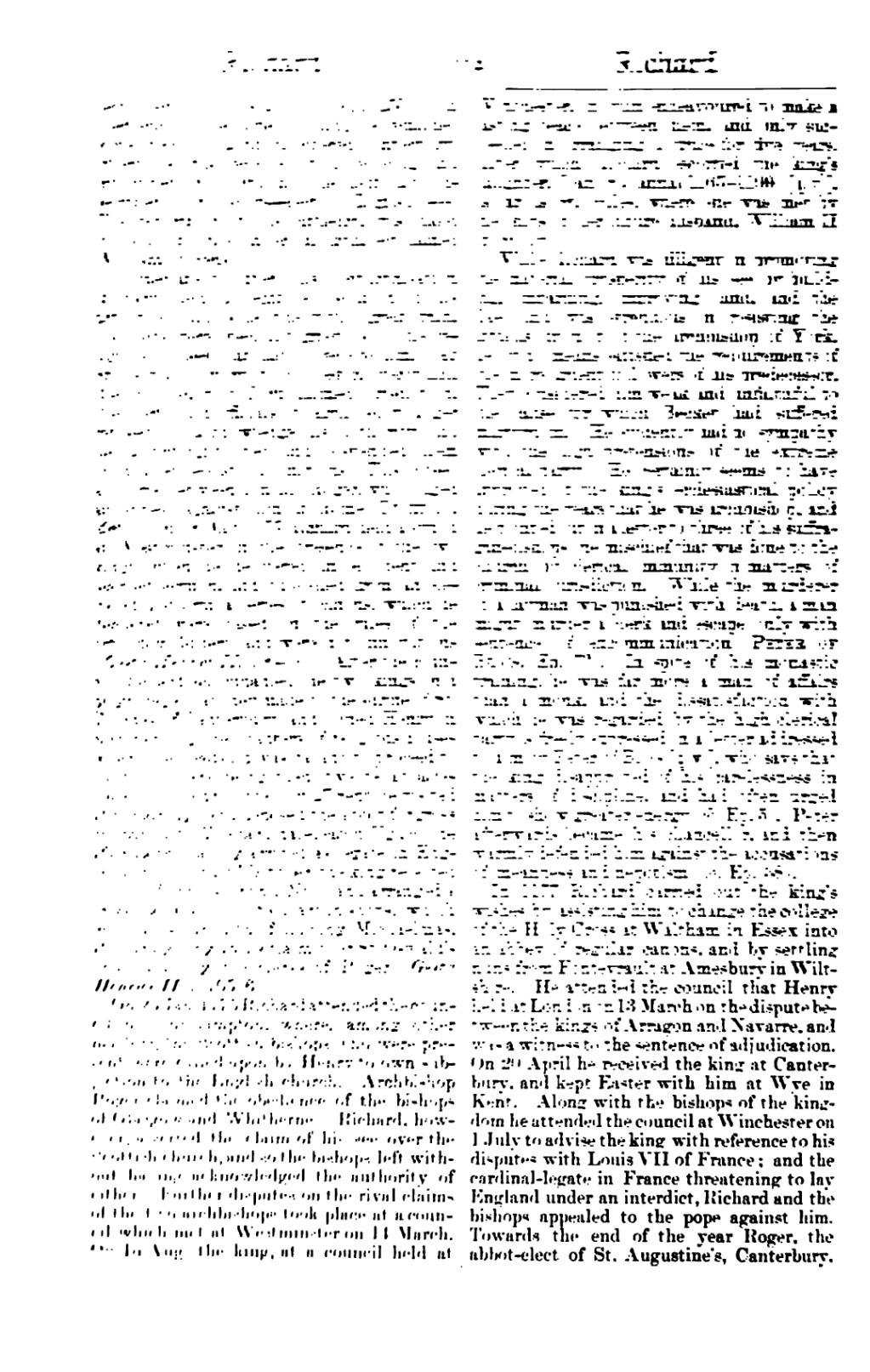destroyed (Gervase, i. 3 sqq., 250). In obedience to the pope's bidding he remained some weeks in London, entered Canterbury, where he was received with rejoicing and enthroned on 5 Oct., and the next day consecrated four bishops-elect to English sees. The restoration of the cathedral was taken in hand at once under an architect named William of Sens.
Immediately after his enthronisation Richard held a legatine visitation of his province; and as he rode with a great train, his visits were specially grievous to the religious houses that had to receive him. At St. Oswald's priory at Gloucester, over which the archbishop of York claimed jurisdiction, the clerks and officials of Archbishop Roger refused to acknowledge his authority, and he accordingly cited and suspended them from all ecclesiastical functions. This caused a quarrel between him and Roger, who lodged an appeal against him at Rome (Diceto, i. 396). On 18 May 1175 Richard held a synod at Westminster in the presence of the two kings, when he delivered an eloquent and learned sermon, and published from an elevated platform a series of canons, which he declared were based on the rules of the orthodox fathers, and were not innovations (Gesta Henrici II, i. 84–9). After the council Richard accompanied the two kings on a pilgrimage that they made to the shrine of St. Thomas of Canterbury, and joined Henry in commanding the chapters of religious houses where the headship was vacant to proceed to election, there being then twelve abbacies vacant in his province. On 27 Sept. he visited Peterborough and deposed the abbot for gross misconduct. The cardinal-deacon Uguccione Pier Leoni having arrived as legate in England in the end of October, the king received him at Winchester on 1 Nov., and arranged a truce between the two archbishops, which was to last until the following Michaelmas, Richard giving up his claim over St. Oswald's and absolving the clerks of Roger (Gesta Henrici II, i. 105–6).
On 25 Jan. 1175–6 Richard attended the council of Northampton, where, among other matters, the Scottish bishops who were present were called upon by Henry to own subjection to the English church. Archbishop Roger claimed the obedience of the bishops of Glasgow and Whitherne. Richard, however, asserted the claim of his see over the Scottish church, and so the bishops left without having acknowledged the authority of either. Further disputes on the rival claims of the two archbishops took place at a council which met at Westminster on 14 March. On 15 Aug. the king, at a council held at Winchester, in vain endeavoured to make a lasting peace between them, and only succeeded in arranging a truce for five years. After which Richard escorted the king's daughter, Joan or Joanna (1165–1199) [q. v.], as far as St. Gilles, where she was met by the ships of her future husband, William II of Sicily.
While Richard was diligent in promoting the material prosperity of his see by building, imparking, improving land, and the like, and was strenuous in resisting the attacks upon it of the archbishop of York, he by no means satisfied the requirements of the more ardent followers of his predecessor. They considered him weak and unfaithful to the cause for which Becket had suffered martyrdom. He evidently had no sympathy with the high pretensions of the extreme clerical party. He certainly seems to have approved of the king's ecclesiastical policy during the years that he was archbishop, and he pointed out in a letter to three of his suffragan-bishops one mischief that was done to the church by clerical immunity in matters of criminal jurisdiction. While the murderer of a layman was punished with death, a man might murder a clerk and escape only with sentence of excommunication (Peter of Blois, Ep. 73). In spite of his monastic training, he was far more a man of affairs than a monk, and the dissatisfaction with which he was regarded by the high clerical party is freely expressed in a letter addressed to him by Peter of Blois [q. v.], who says that the king disapproved of his carelessness in matters of discipline, and had often urged him to show greater energy (ib. Ep. 5). Peter afterwards became his chancellor, and then warmly defended him against the accusations of meanness and nepotism (ib. Ep. 38).
In 1177 Richard carried out the king's wishes by assisting him to change the college of the Holy Cross at Waltham in Essex into an abbey of regular canons, and by settling nuns from Fontevrault at Amesbury in Wiltshire. He attended the council that Henry held at London on 13 March on the dispute between the kings of Arragon and Navarre, and was a witness to the sentence of adjudication. On 20 April he received the king at Canterbury, and kept Easter with him at Wye in Kent. Along with the bishops of the kingdom he attended the council at Winchester on 1 July to advise the king with reference to his disputes with Louis VII of France; and the cardinal-legate in France threatening to lay England under an interdict, Richard and the bishops appealed to the pope against him. Towards the end of the year Roger, the abbot-elect of St. Augustine's, Canterbury,
